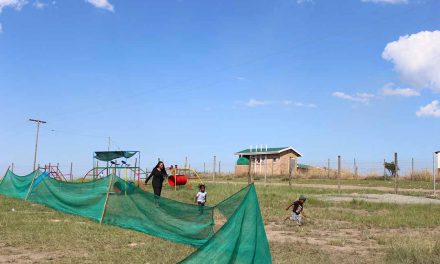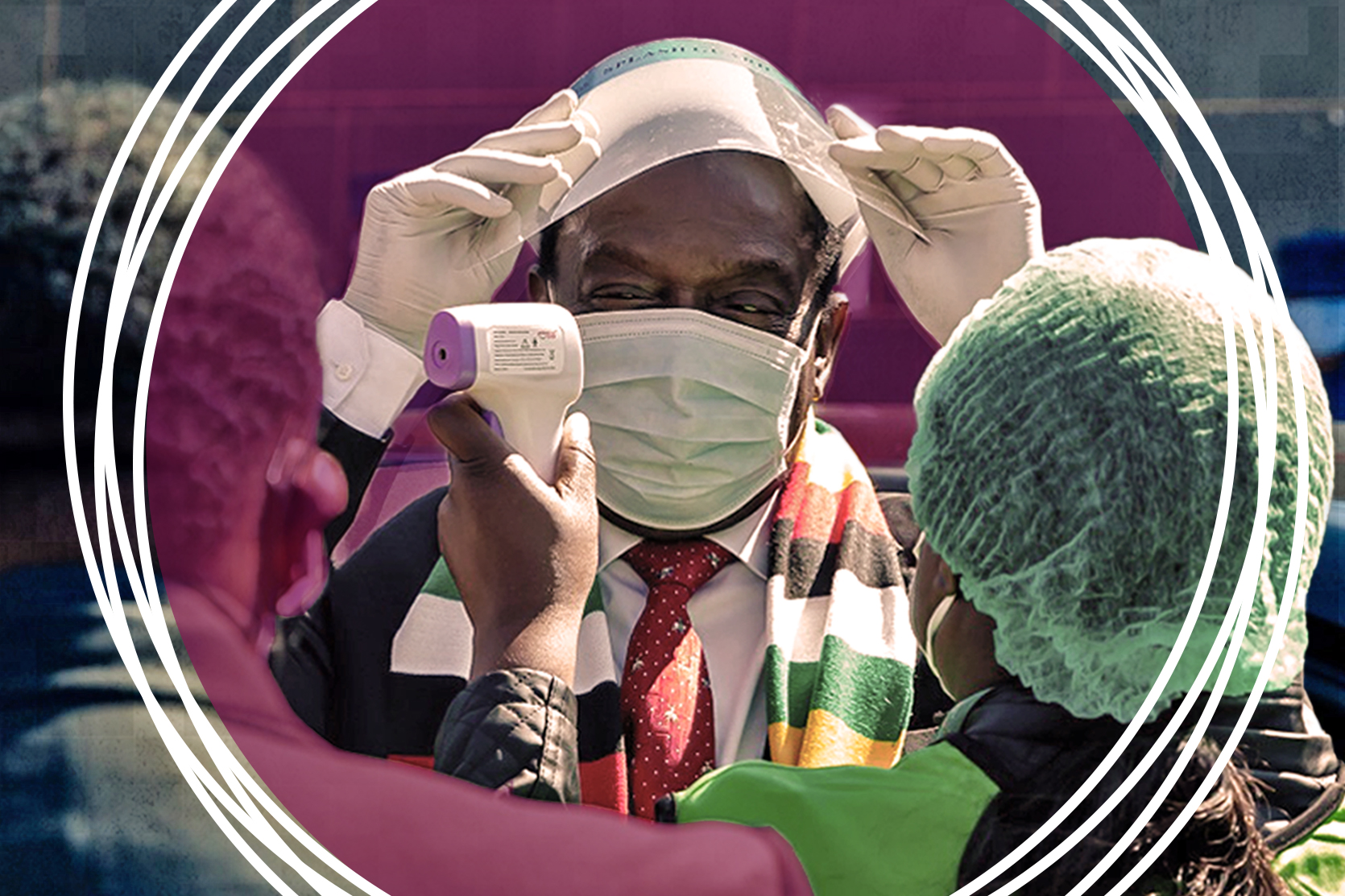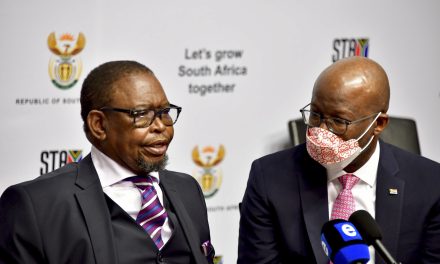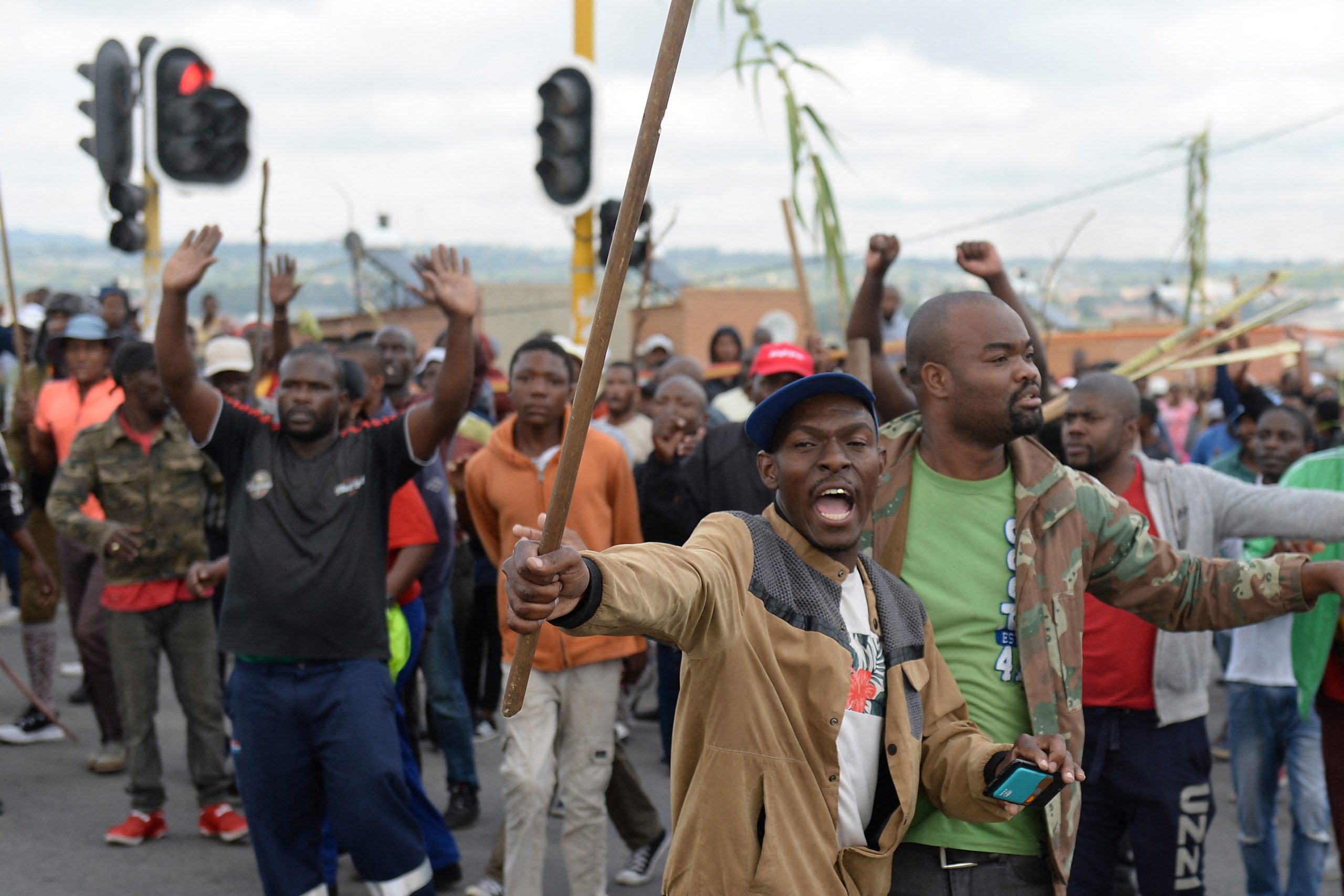CAR will struggle to break the cycle of violence without international commitment to end it
On January 4, the incumbent president of Central African Republic (CAR), Faustin-Archange Touadéra, was re-elected for a second term after the country’s electoral commission announced he defeated 16 other candidates and garnered 53.9 percent of the vote, enough to render a runoff unnecessary.
DThe elections have generated an upsurge in violence triggered following the Constitutional Court’s rejection of former President François Bozizé’s candidacy on December 3. The court cited his failure to meet the constitution’s “good morality” requirement due to an international warrant and UN sanctions against him for his alleged involvement in assassinations, torture and other crimes during his tenure.
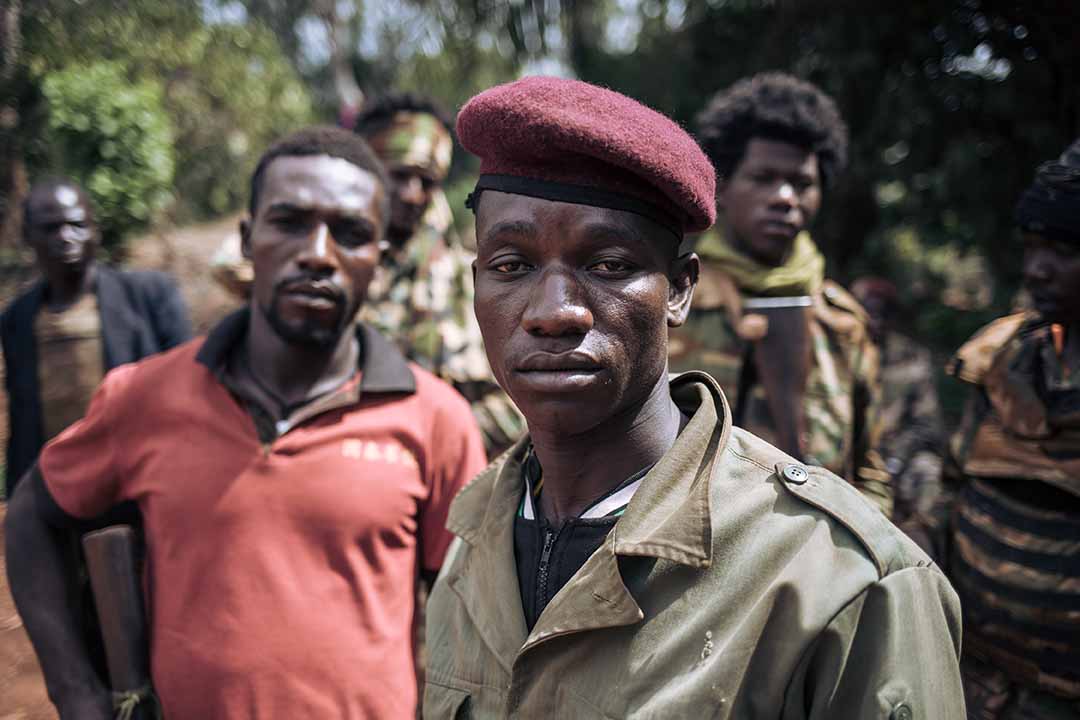
Militiamen of the armed group coalition Coalition of Patriots for Change (CPC) in the village of Niakari, which marks the front line with Central African army and its allies, north of Bangassou. On January 3, 2021, the city of Bangassou was attacked by hundreds of CPC militiamen, causing tens of thousands of people to flee into the bush and neighbouring DR Congo. Since the end of December 2020, the rebel coalition has taken control of the main roads and several of the country’s major cities. Photo: Alexis Huguet/AFP
Following the announcement, Bozizé joined a coalition of armed groups, the Coalition of Patriots for Change (CPC), some of whom were formerly part of the Séléka coalition which toppled him in 2013. They launched attacks on several towns outside of Bangui in an effort to force an election postponement and initiative a new round of peace talks.
Over the course of December, hundreds of civilians died, 30,000 were forced to flee into neighbouring Cameroon, Chad, and the Democratic Republic of the Congo, while another 185,000 were internally displaced. Three UN Multidimensional Integrated Stabilization Mission (MINUSCA) peacekeepers lost their lives in the violence.
To help quell the violence, CAR requested additional military assistance from Rwanda and Russia. Both sent troops and supplies in support of the Central African Armed Forces (FACA), while France carried out flyover missions in the days preceding elections. CAR prosecutors have launched an investigation into Bozizé, who is accused of plotting the alleged coup.
Violence has escalated further since the announcement of Touadéra’s victory, with most of the opposition calling for the election results to be annulled citing voting irregularities and the fact that instability prevented many from casting their ballot. On January 13, the CPC launched a coordinated attack on the outskirts of Bangui before being pushed back by MINUSCA in fighting which killed one Rwandan soldier and several CPC fighters.
The election, which is only the second in the country’s history, was supposed to be an important milestone. However, this new round of violence has laid bare the deep flaws in the peace process and threatens to undo the tentative progress made towards stability since the signing of the Political Agreement for Peace and Reconciliation in February 2019.
If urgent action is not taken by international and regional actors to both address flaws in the peace process as well as some of the country’s deep structural drivers of conflict, CAR could slip into civil war in the coming months.
A cycle of violence
Since gaining independence from France in 1960, CAR’s political history has been punctuated by military rule, rebellion, and multiple coups against a backdrop of state disintegration, deep interethnic cleavages, and high levels of inter-communal conflict. The violence which was seen before, during, and following the December election is not unique, it is instead merely the latest expression of this long-running conflict.
Former President Bozizé seized power in a 2003 coup before being removed in 2013 by the Séléka: a coalition of predominantly Muslim armed groups, at least some of whom represented communities in northern CAR, who have historically been politically and economically disenfranchised. Following the rebellion, an opposing association of local Christian and animist self-defence groups, the “Anti-balaka”, engaged in retaliatory attacks, which escalated to the ethnic cleansing of the Muslim population.
In the following years, the country was plagued by violence despite efforts to restore stability, including the deployment of a 12,800-strong UN peacekeeping force. After a two-year transition led by a temporary government, CAR returned to constitutional democracy with the election of Touadéra in February 2016.
The new president continued to engage in dialogue with former Séléka and Anti-balaka armed groups, who had by this time fragmented and reconfigured. In February 2019, the Political Agreement for Peace and Reconciliation was signed between the government and the country’s 14 main armed groups.
Despite the political agreement, as well as the deployment of MINUSCA peacekeeping forces, the conflict has continued. The 2020 UN Panel of Experts’ assessment of the political agreement reported hundreds of violations and noted the continued exchange of accusations of reneged commitments by both the government and armed groups.
Since 2013, it is estimated that of the country’s population of roughly five million, about one in five people have been internally or externally displaced, thus creating the world’s highest humanitarian caseload per capita.
Outsourcing governance
There are a number of structural issues that keep CAR trapped within a cycle of conflict and underdevelopment. Multiple peace agreements have failed to address these deeper realities, and some have, at times, contributed to incentivising those who benefit from instability.
As outlined by Louisa Lombard, professor of anthropology at Yale University, rather than develop local government administration, French colonial officials leased CAR’s territories to private companies to run at their own profit or loss and to strike deals with local tribes to provide labour and security.
This system has effectively continued post-independence, whereby political elites in Bangui with little capacity, experience, or interest in extending governance beyond the capital, grant mining concessions to a range of international actors who rely on private military companies (PMCs) to facilitate transport and security without building out local government or infrastructure.
Basic services are mostly outsourced to the UN, European Union, and international NGOs and due to multiple coups, and in particular, Bozizé’s efforts to reduce the army to a presidential guard] to ward against coups, the state does not have a monopoly on the use of force in most of its territory.
Security has been privatised in a chaotic way by local leaders, clans, and militias, leaving communities to essentially fend for themselves. It has also provided ample opportunity for non-state actors to develop criminal enterprises in order to exploit the country’s vast natural resources.
Today, armed groups control most territory outside of the capital and there is little in the way of a social contract between citizen and state.
Militarisation of politics and peacemaking
In a closed political system, comprised of a small political elite in Bangui, violence has become a tried and tested route to power. Rebel leaders cycle between armed groups, which serve both as a vehicle for illicit criminal activity as well as helping to guarantee them a place on the political chessboard when the incitement of enough chaos forces the government into a political dialogue.
The state has a history of incentivising this behaviour by co-opting rebel leaders during political settlements in the interest of creating temporary peace, thereby rewarding those who make a living out of provoking insecurity. Most major peace agreements since 1997 have awarded government positions to rebel leaders.
The 2019 Political Agreement was no different. Like previous peace deals, it provided the leaders of signatory armed groups government posts. For example, three of them gained positions as “Special Military Advisors” to the prime minister to oversee the creation of Special Mixed Security Units (USMS) comprised of armed group combatants and Central African state forces.
After disagreements regarding the pay and titles of former combatants within the new USMS units, two of the three special military advisers – who are also leaders of the country’s two strongest armed groups – resigned, while the third used his status to continue the operations of his armed group and expand his territorial control.
Last month’s election was an attempt to move the country towards a more orderly political settlement, whereby leaders would represent a political base and have popular support to hold office. The armed groups can no longer be said to represent communities’ grievances and are widely despised by citizens. They are therefore reluctant to transform into legitimate political parties and by disrupting the elections, hope to return CAR to a state where, as political-military entrepreneurs, they can find themselves a seat at the table.
A playground for foreign actors
Adding complexity to finding a lasting political solution to the conflict in CAR are the large number of international and regional actors who have interests and influence in the country. Over the last 10 years, Chad, Angola, and most recently Sudan, have all played host to political negotiations between armed groups and the CAR government – each driven by their own geostrategic interests. The porous borders between the CAR and its neighbours have allowed for ethnic groups having strong cultural allegiance and economic ties outside of the country.
In recent years, Russia has stepped up efforts to support Touadéra’s government through the Wagner Group: a private security company closely connected to the Kremlin and often used by the Russian state as a proxy force when plausible deniability is necessary. The head of the Wagner Group in CAR was appointed national security adviser, affords President Touadéra personal protection services, and provides some training to FACA.
Russian interests in CAR seem to be both financial (acquiring access to diamonds, gold, and other mining contracts) and part of the country’s wider strategy in Africa, aimed at countering American influence and gaining greater African support for Russian initiatives at the UN.
France, which has historical ties with CAR, and contemporary economic and security interests in the country, continues to push back against Russian influence. Ahead of last month’s elections, rival French and Russian disinformation campaigns that sought to influence internet users in CAR emerged.
Facebook released a statement saying it had suspended over 100 accounts and pages for “coordinated inauthentic behaviour” linked to CAR. One network was linked to “individuals associated with French military”, while another two had connections to “individuals associated with past activity by the Russian Internet Research Agency” as well as Russian businessman Evgeny Prigozhin, head of the Wagner Group.
Charting a way forward
Escalating insecurity in CAR calls for a thorough review of the Political Agreement for Peace and Reconciliation in order to determine whether it remains a relevant road map for peace and stability. If armed groups continue to refuse to transform into legitimate actors and can simply instigate violence as a means of political manoeuvring with little repercussion, a negotiated political process seems unlikely to work in the long term.
At the very least, MINUSCA should be strengthened and their mandate revised so they can take a more aggressive posture against those armed groups that continue to act as spoilers to peace. A more concerted effort is also required to train, equip, and expand CAR’s armed forces to the point where state authority may be reinstalled across wider regions of the country.
The international community must also face the reality that without significant investment in the economic development of CAR, the country may not ever be able to rise out of the cycle of conflict and poverty. This will require international community and influential regional actors to raise the interests of CAR above their own and work together in a transparent manner to support sustainable peace efforts.
The African Union (AU) should use CAR’s recent election as a case study in developing a typology of online disinformation strategies and countermeasures, in order to counter future attempts by foreign actors to influence African elections through online disinformation campaigns.
The views expressed in this article are the author’s own and do not necessarily reflect Al Jazeera’s editorial stance.
Stephen Buchanan-Clarke is a security analyst with several years' experience working in both conflict and post-conflict settings in Africa, primarily on issues of peace and security; transitional justice and reconciliation; democratisation and governance; and preventing and countering violent extremism. He currently serves as head of the Human Security and Climate Change (HSCC) project at Good Governance Africa and is a co-editor of the Extremisms in Africa anthology series.


